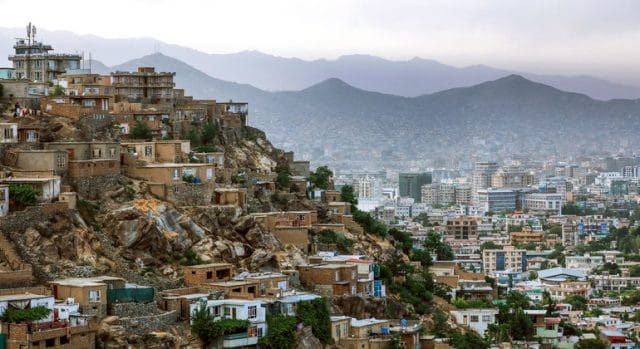

The Islamic State in Khorosan Province (ISKP) has claimed responsibility for the deadly explosions which occurred on Thursday evening, local time, amid ongoing evacuations from the country in the wake of the Taliban takeover.
More than 160 people, including 13 United States troops, were killed, according to media reports.
Threat to peace
The Security Council issued a statement condemning the attack in the strongest terms.
“The members of the Security Council reaffirmed that terrorism in all its forms and manifestations constitutes one of the most serious threats to international peace and security,” it said. “Deliberately targeting civilians and personnel assisting in the evacuation of civilians is especially abhorrent and must be condemned.”
Ambassadors expressed their deepest sympathy and condolences to the families of the victims, and wished a speedy and full recovery to the injured.
Stay and deliver
In condemning the attack, the UN Assistance Mission in Afghanistan (UNAMA) underlined the Organization’s commitment to stay and deliver, UN Spokesperson Stephane Dujarric told journalists in New York.
“The UN has been working for the people of Afghanistan for decades and the Mission stressed that we will remain and do everything for the people of Afghanistan who have suffered so much,” he said.
The Deputy UN Special Representative and Humanitarian Coordinator in Afghanistan, Ramiz Alakbarov, saluted medical NGOs who are responding to civilians wounded in the attack, including children.
He also reiterated the UN’s commitment to the people of Afghanistan, and called for their immediate protection.
Concern for children
The Representative of the UN Children’s Fund (UNICEF) in Afghanistan, Hervé Ludovic De Lys, also joined UN officials condemning the attack.
“We call on all parties to ensure women and children are protected, at all times,” he said in a statement issued on Friday.
UNICEF is deeply concerned about children’s safety, and the rise in grave violations against them in recent weeks, he added.
“With increased conflict and insecurity, children in Afghanistan have already paid a devastating price. More than 550 children were killed and over 1,400 injured since the start of 2021.”
‘Hideous assault’ on civilians
The terrorist attack “was a horrendous move by ISIL Khorasan”, said Rupert Colville, Spokesperson for the UN human rights office, OHCHR, speaking in Geneva on Friday during the bi-weekly briefing by UN agencies.
“It was clearly calculated to kill and maim as many people as possible: civilians, children, women, fathers, mothers, as well as Taliban and foreign forces protecting the airport,” he told journalists.
“It was an attack specifically designed to cause carnage and it has caused carnage. This was a hideous assault on desperate civilians and we hope those responsible are caught and brought to justice as soon as possible.”
Regional plan for Afghan refugees
Meanwhile, around 500,000 new Afghan refugees are expected in the region by the end of the year, the UN refugee agency, UNHCR, warned on Friday.
UNHCR presented its Regional Preparedness and Emergency Plan for Afghan Refugees, appealing to neighbouring countries to keep their borders open to those seeking to escape the intensifying crisis.
The half a million number is “a worst-case scenario”, the agency said.
Emergency preparation
Based on an analysis of ongoing social, economic, political and the security situation, “the purpose of the figures is to enable us to plan and preposition important assistance so that urgent interventions can be scaled up quickly, efficiently as possible and if needed”, said Kelly Clements, UNHCR Deputy High Commissioner.
The plan is seeking $299 million to support the activities of UN agencies this year, including UNHCR, the World Food Programme (WFP), and the UN Children’s Fund (UNICEF), as well as partner NGOs.
“This is about contingency planning. It is not the actual response”, said Ms. Clements. “Increased and immediate funding will allow us to preposition core relief items and be ready for emergency interventions”.
She emphasized that significant movements across borders are not yet taking place, and that the greatest needs remain inside the country, where the impacts of the conflict have been compounded by a severe drought and the COVID-19 pandemic.
The UN humanitarian affairs office, OCHA, also joined the call for funding.
“At the beginning of this year, we estimated that around 18 million people are in need of humanitarian assistance,” said Wafaa Saeed Abdelatef, Director of its Coordination Division.
She warned that needs have increased, compounded by conflict, drought and COVID-19, adding that “flexible funding” must be scaled up urgently as resources are being stretched and winter is approaching.
FAO supporting livelihoods
The UN Food and Agriculture Organization (FAO) has called for scaling up humanitarian assistance in the country, which continues to be hit hard by an ever-worsening drought that threatens more than seven million people who depend on agriculture or livestock for their income.
As of this month, FAO has provided livelihood and cash assistance to almost one million people across 26 out of the country’s 34 provinces,
More than 20,000 households were reached in the last two weeks alone, and FAO plans to assist 250,000 vulnerable farming families during the upcoming winter wheat season.
The agency further reports that its Drought Response Plan for Afghanistan currently faces an $18 million shortfall.
UNDP trains farmers
Relatedly, the UN Development Programme (UNDP) and partners this week continued training Afghan farmers who will help their counterparts adopt better planting practices.
UNDP continues to be active in all regions, supporting essential services, small infrastructure and livelihoods for the most vulnerable citizens.
The agency’s projects are ongoing and will be scaled up where safety and operational conditions allow because “the Afghan people need development and humanitarian support more than ever.”
Source UN News
